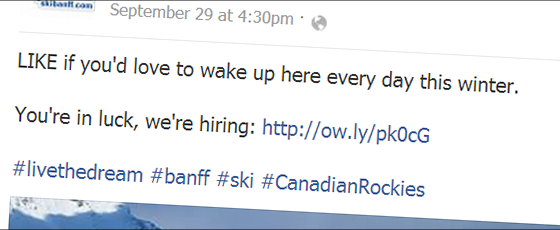Social Media
Should a Ski Resort Ask for Engagement on Social Media? Sherlock’s Findings.


BLANCHARD
Every once in a while I get an idea that I can’t leave alone. And every once in a while one of those ideas won’t let go for weeks.
I’ll put myself in the shoes of people on both sides and won’t give up until I’m satisfied with my answer. Over and over again I found myself in a Sherlock Holmes-like mode analyzing every detail, chatting with any witnesses I could, seeing their perspective, and searching for a conclusion.
This time it was the idea of asking for engagement. Rarely do people justify their harsh feelings of this practice, so let me share my journey into the “why”.
Step 1: I Dislike It
I started with the fact that I, and most of my marketing peers, dislike it. For many, “dislike” is an understatement.
I can’t remember what triggered it, but I suddenly wasn’t satisfied with the idea that just because marketers don’t “like” it means that it’s bad and wrong. So I dug deeper.
Step 2: The Numbers
Next, I pulled some numbers. The results were clear: asking for engagement gets engagement. As in, most requests get 4x the engagement of other posts (you can tell from my takeaways at the bottom whose shoes I was wearing at this point).
But that didn’t satisfy me because what does it mean for social media to “work”? Is all engagement created equal? A can of worms indeed.
Step 3: Working Hard or Hardly Working
I’ll set retweets aside for a sec, but I learned something interesting about asking for engagement on Facebook and its effect on EdgeRank: it doesn’t help.
Shares may increase reach of these messages (which may not be a good thing for your brand, I’ll get there in a second), but asking for engagement doesn’t boost your EdgeRank like you’d expect. And why? Because Facebook changed the algorithm. I have no idea how I missed that tidbit in August.
Step 4: Do People Care? People Do Care.
I’m positive my marketing friends are completely tired of me asking “are marketers the only ones that are annoyed by brands asking for engagement?” If only someone did a survey of Facebook fans…then we’d know. Oh wait, they did. And users said that to determine if something was “valuable” they asked:
“Is the content genuinely interesting…or is it trying to game News Feed distribution? (e.g., asking for people to like the content)”
Which is why Facebook now detects posts that ask for engagement and doesn’t reward their EdgeRank with the extra interaction they get.
Step 5: What Does It Say
Ironically, the argument I tried to make for asking turned out be the same argument I used against it. I said to myself, “even if you don’t say you want to win a pickup game of basketball, you still want to win. So why does saying so make a difference?”
But asking “why” doesn’t change the fact that it does make a difference. For some reason, vocalizing goals like these makes you look overeager and/or awkward. That just seems to be the way it is.
I believe the same thing happens when you ask for engagement. Everyone may want more likes, but asking for them makes you appear a little desperate and awkward. Actually, let me rephrase that, it makes your resort’s brand look awkward.
Step 6: Are There Exceptions?
Throughout the process I occasionally saw exceptions. I couldn’t find a common thread until, chatting with Alex Kaufman one day, he hit one reason right on the head when he compared needs vs wants. If you ask for engagement because you want more, that’s when you get into trouble.
However, if you ask for engagement because someone else needs it, it does seem to be more acceptable in certain situations and for certain brands. Amber alerts, dangerous storms, time-sensitive news/info, etc. seem to fit in here somewhere.
Conclusions
So, as I take off my Deerstalker, let me say share my final conclusions.
My rule would be to say NO to asking for engagement and deal with exceptions one-by-one erring on the side of not posting. The marketer’s instinct says this isn’t a good road for brands and this time they’ve got it right.
So, I’m right back where I started. Funny how that works. But hey, it was an interesting journey and I learned a lot along the way.
About Gregg & SlopeFillers
I've had more first-time visitors lately, so adding a quick "about" section. I started SlopeFillers in 2010
with the simple goal of sharing great resort marketing strategies. Today I run marketing for resort ecommerce and CRM provider
Inntopia,
my home mountain is the lovely Nordic Valley,
and my favorite marketing campaign remains the Ski Utah TV show that sold me on skiing as a kid in the 90s.
Get the weekly digest.
New stories, ideas, and jobs delivered to your inbox every Friday morning.
